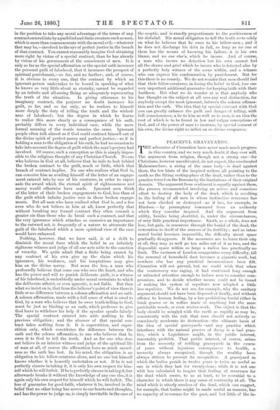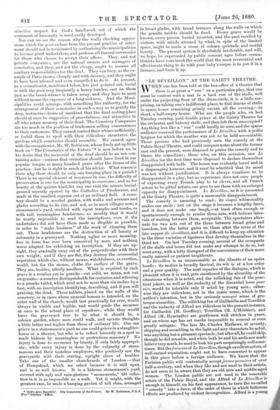PEACEFUL GRAVEYARDS.
THE advocates of Cremation have never made much progress in this country, and we very much doubt if they ever will. The argument from religion, though not a strong one—for Christians, however uncultivated, do not expect, like uneducated Mahommedans, a rising of the same body—is dead against them, the few hints of the inspired writers all pointing to the earth as the fitting resting-place of the dead, rather than to the practice forced on the Romans by the limitations of their original domain. The argument from sentiment is equally against them, the process recommended involving an active and conscious effort to destroy the body of the dead, which is revolting to the feeling of all men in whom instinctive reverence has not been checked or destroyed—as it has, for example, in Hindoos — by peremptory command from an authority which they consider inspired. And the argument from utility, besides being _doubtful, is, under the circumstances, of very little practical importance. Earth, as a whole, does not lose, but gain, in resources through the burial of the dead, the restoration to itself of the sources of its fertility ; and as intra- mural burial becomes impossible, the difficulty about space gradually disappears. If the mourners are to leave their city at all, they may as well go ten miles out of it as two, and the disposable space within so large a radius has practically no limit. The vastness of London exaggerates every difficulty, till the removal of household dust becomes a gigantic work, but nowhere else has any practical inconvenience been felt. Cremation will not prevail, but we could wish that when the controversy was raging, it had continued long enough or attracted attention enough to induce men to consider com- promises, and to decide whether means could not be found of making the system of sepulture now adopted a little less repulsive. We do not see, for example, why the sanitary argument should not have been disposed of finally, and without offence to human feeling, by a law prohibiting burial either in brick graves or in coffins made of anything but the more perishable woods, or even wicker-work. The object is that the body should be mingled with the earth as rapidly as may be, consistently with the rule that man should not actively or consciously accelerate its destruction—the ultimate basis of the idea of special graveyards—and any practice which interferes with the natural process of decay is a bad prac- tice, which a Legislature might, in the public interest, reasonably prohibit. That public interest, of course, arises from the necessity of refilling graveyards in the course of years without injurious consequences to health, a necessity always recognised, though the wealthy have always striven to prevent its recognition. A graveyard in which the bodies perish in twelve years is twice as useful as one in which they last for twenty-four ; while it is not one whit less calculated to inspire that feeling of reverence for the dead which seems, to us at least, to be essential to a character in which there is any sense of continuity at all. The mind which is utterly careless of the dead, which can suggest, for example, that bodies might be made useful as manure, has no capacity of reverence for the past, and but little of the in-
stinctive respect for God's handiwork out of which the sentiment of humanity is most easily developed.
Nor can we see the reason why the really shocking oppres- sions which the poor endure from the present practice of inter- ment should not be terminated by authorising the municipalities to become great undertakers, and perform all funeral ceremonies for those who choose to accept their offices. They, and not private companies, are the natural owners and managers of cemeteries, and they, and not the clergy, ought to assume all sanitary responsibilities for the dead. They can bury, as the ex- ample of Paris shows, cheaply and with decency, and they ought to have been allowed and even compelled to do it. At present, as a cremationist, mentioned below, has just pointed out, burial is with the poor very frequently a heavy burden, cast on them just as the bread-winner is taken away, and they have to meet without means the expenses of a long sickness. And the Muni- cipalities could arrange, with something like authority, for the arrangement of their cemeteries in such a way as to gratify the deep, instinctive desire of mankind that the final resting-place should at once be suggestive of peacefulness, and attractive to all who retain memory of their dead. The Cemetery Companies are too much in the position of tradesmen selling conveniences to their customers. They cannot control their whims sufficiently, or forbid them to spoil with their ridiculous structures the gardens which cemeteries should resemble. We cannot agree with the cremationist, Mr. W. Robinson, whose finely got up little book on " The Cemeteries of the Future "* is now before us, in his desire that the memorial of the dead should be an urn con- taining ashes—curious that cremation should have lived in our popular tongue so many hundred years after the disuse of the practice—but he is right in much of his advice. What reason is there why there should be only one burying-place in a parish P There is no special element of reverence in size, the difficulty of preservation is one for the municipality to overcome ; and as for beauty of the quieter kind, let any one visit the minute burial- ground recently opened by the Catholics of Freshwater, and made at the smallest expense out of an ordinary field. A ceme- tery should be a wooded garden, with walks and avenues and glades according to its size, and not, as in most villages now, a stonemason's yard, studded with squat temples and tombs, or with tall, meaningless headstones, so mouldy that it would be nearly impossible to read the inscriptions, even if the undertakers did not have them made as illegible as possible, in order to "make business" of the work of cleaning them out. These headstones are the destruction of all beauty or solemnity in a graveyard. Nothing uglier or more meaning- less in form has ever been conceived by man, and nothing worse adapted for exhibiting an inscription. If they are up- right, they gradually sway out of the perpendicular with their own weight; and if they are flat, they destroy the reverential vegetation which else, without means, watchfulness, or exertion, would, but for the stones, clothe the surface of the grave. They are, besides, utterly needless. What is required by each grave is a number cut in granite—cut solid, we mean, not cut on granite—a number distinguishable for centuries, and referring to a granite tablet, which need not be more than six inches by a foot, with an inscription identifying, describing, and if you will praising, the dead. These tablets, placed on the walls of the cemetery, or in cases where unusual honour is intended, on the outer wall of the church, would last practically for ever, would always be visible and legible, and would guide the mourner at once to the actual place of sepulture; while they would leave the graveyard free to be what it should be, a solemn garden, where men could walk, and secrete thoughts a little better and higher than those of ordinary life. One can grieve in a stonemason's yard as one could grieve in a slaughter- house or a theatre, but who is to reflect leisurely in a spot so made hideous by meaningless or pretentious masonry P No injury is done to reverence by beauty, if only fairly appropri- ate; while every injury is done by the vulgarity of stone- masons and their tasteless employers, who positively sow the graveyards with their staring, upright slices of boulder. Take one of the smaller churchyards of London —that of Hampstead, which we select because it is still open, and is so well known. It is a hideous stonemason's yard, covered with ugly and vain-glorious "monuments," till reflec- tion in it is as impossible as a walk. Yet it might, with the greatest ease, be made a hanging garden of tall elms, arranged
• God's dere Beautiful. The Cemeteries of the Future. By W. Robinson, F.L.S. The " Garden" Moe.
in broad glades, with broad terraces along the walls on which the granite tablets should be fixed. Every grave would be known, every person buried recorded, and the past recalled by visitors with minds attuned by what, in spite of the limited space, might be made a scene of solemn quietude and restful beauty. The present system is absolutely intolerable, and will, we hope, be superseded by public consent ages before crema- tionists have convinced the world that the most reverential and affectionate thing to do with your baby's corpse is to put it in a furnace, and burn it up.



































 Previous page
Previous page